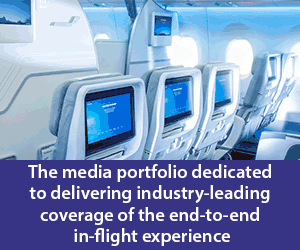The Crystal Cabin Award have announced the finalists for this year’s 12th annual award, with a total of 24 products and concepts in the final round of eight categories.
The 24 finalists will now have to present their ideas in person to the 28 expert jury members. The winners will be announced as part of the Aircraft Interiors Expo (10-12 April in Hamburg) at a gala dinner to be held at the Hotel Atlantic Kempinski on the evening of Monday 10 April. This year, for the first time, the white trophies will be produced using 3D printing technology.
New to the awards is the IFEC or In-flight Entertainment and Connectivity category. Finalists include Bluebox Aviation Systems with the Bluebox Accessible IFE platform which provides access to in-flight entertainment for visually impaired passengers on long-haul routes, the product is already in use in partnership with Virgin Atlantic. The European Aviation Network from Inmarsat has also made the finals. More than 300 Deutsche Telekom ground stations will provide passengers with LTE network access in-flight throughout Europe this year. United Screens has become a finalist with the first on-board 3D television, which can be used without the need for 3D glasses.
In the final of the Cabin Concepts category this year is Airbus with the Airspace cabin for the A320 range of aircraft with extra-large overhead lockers and atmospheric lighting to improve the flying experience. PriestmanGoode has made the final with a long-haul Business-Class product, the QSuite for Qatar Airways, while Singapore Airlines is in the final with its new A380 First Class suites.
The PASSME Consortium’s PASSME Innovative Aircraft Seat, a finalist in the Cabin Systems category makes it possible to push the seats of an economy row together during boarding, creating more aisle space, resulting in less congestion and quicker boarding. Rockwell Collins ‘Silhouette MOVE’ is in the final – a flexible partition between business and economy that curves to allow economy passengers behind to stretch their legs or stow heavy cabin baggage. While finalist Zodiac Aerospace’s aircraft urinal cabin Durinal, will reduce the queue for the rest of the cabin.
Boeing’s Cabin Dry Floor has made the final of the Greener Cabin, Health, Safety and Environment category with its absorption of moisture to leave a dry, germ-free surface. Villinger has also made the final with its allegedly indestructible heated floor panel. The third finalist is VT Miltope with security software for wireless cabin networks.
In the Materials and Components category, Airbus and Altran aim to make heavy, space-consuming cable harnesses behind the cabin wall panels a thing of the past, in the future, wiring – for lighted signs, for example – will be produced by a direct Printed Electrics process. Rockwell Collins made the final in this category with the Secant Luminous Panel that lights up the complete cabin ceiling with high-resolution images. Weigele Aerospace reached the final with its ‘Airborne Cooking Robot’, an energy-saving oven for the gallery that allows for cold and warm food to be prepared on one plate at the same time.
The Passenger Comfort Hardware category finalists include LIFT by EnCore, which in collaboration with Boeing, has developed a comfortable approach to long-haul seating ‘even in tourist class’ for the 787. Rockwell Collins developed the Valkyrie Bed, a form of roll-up mattress for business class, which can be drawn from the side panel across the seat. Zodiac Aerospace also made the final with the Eco Zlounge that enables economy class passengers to stretch their legs onto empty seat surfaces in front.
Britain’s Cranfield University made it to the ‘University’ category final with E-tom Smart, a water tap that atomises water to achieve on-board water savings of up to 90% without impacting the cleaning effect. Also in the final is University of Edinburgh with it’s Li-Fi technology, using light to transmit data. The third finalist- America’s University of Cincinnati, together with Boeing, students have developed a hologram surface that turns the aircraft cabin into a virtual extended space.
The Visionary Concepts category sees Airbus a finalist with the Day and Night concept, dividing premium cabins into a living/working zone and a separate sleeping zone. Finalist Renacens provides a virtual view of the cabin with a 3D Seat Map VR that allows passengers to choose their preferred seat for their next flight. Meanwhile, Rockwell Collins has made the final with its Universal Passenger Seat Interface concept: an electronic system for seating that can be deployed everywhere from aircraft to private cars.





